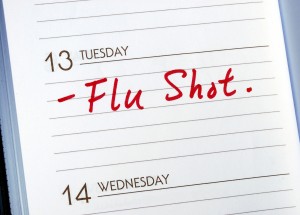CSP Team Note: We recently interviewed Julia Richards, MD, about the importance of flu vaccines. This post is your friendly Smarty reminder to get your kids’ (and your!) flu shots scheduled now. Dr. Richards recently moved to Charlotte and joined Cotswold Pediatrics. We thank her for her time and welcome her to the Queen City! 🙂
Why are flu vaccines so important?
Flu vaccines help to prevent you and your child from getting the flu and passing it on to others. Most of the time, the flu is self-limited (meaning that it gets better on its own). However, at times, the flu can lead to complications like pneumonia, ear infections and other more serious infections. There is no way to predict who will get these complications, so it is important to protect yourself and your child with the flu shot. There are some groups, like infants under 6 months old and people with certain diseases, who can’t get the flu shot, and it is important that we protect them from the flu by making sure those around them are vaccinated.
At what age should a child get a flu shot?
Children should get the flu shot starting at 6 months old and then every year after before flu season (in the fall).
Why isn’t the FluMist vaccine recommended for use in the US anymore?
The FluMist vaccine hasn’t been very effective over the last several years, so it is no longer recommended in the US.
What are the risks of getting your child vaccinated?
Getting the flu vaccine comes with minimal risks. Shortly after the shot is given, your child may have some pain or redness at the site of the injection or develop a low-grade fever, but the vaccine does not cause the flu. Only those with a history of severe allergic reactions to the flu shot should avoid getting it. An egg allergy is no longer a reason to skip the flu shot.
What are some ways to ease a child’s anxiety around shots?
Your attitude toward shots helps your child learn what to expect. Smile and be relaxed, so your child feels more at ease. Distraction can work well, as well as the promise of a reward after the shot. Additionally, most children do well with honesty (i.e., tell them that a shot is like a pinch on the arm that hurts for a second and then gets better) and some may do better with prep work or role-playing at home.
What are the best ways to teach a child the importance of handwashing during flu season?
Reinforce handwashing before eating, after outdoor play and any other time they touch something dirty. Teach your child about germs through fun activities and science experiments. Make handwashing a routine, but also a fun activity by incorporating songs and games. Also, make sure your little one can easily reach the sink and the soap. Most importantly, be a role model. Your child wants to imitate everything you do, so make sure you are washing your hands if you want your child to do so!
What are the first signs of the flu?
The first sign of the flu is usually a high fever, followed by headache, muscle aches, fatigue, cough, congestion and runny nose.
![]()
Levine Children’s Hospital
Facebook
Instagram
Twitter
Pinterest




